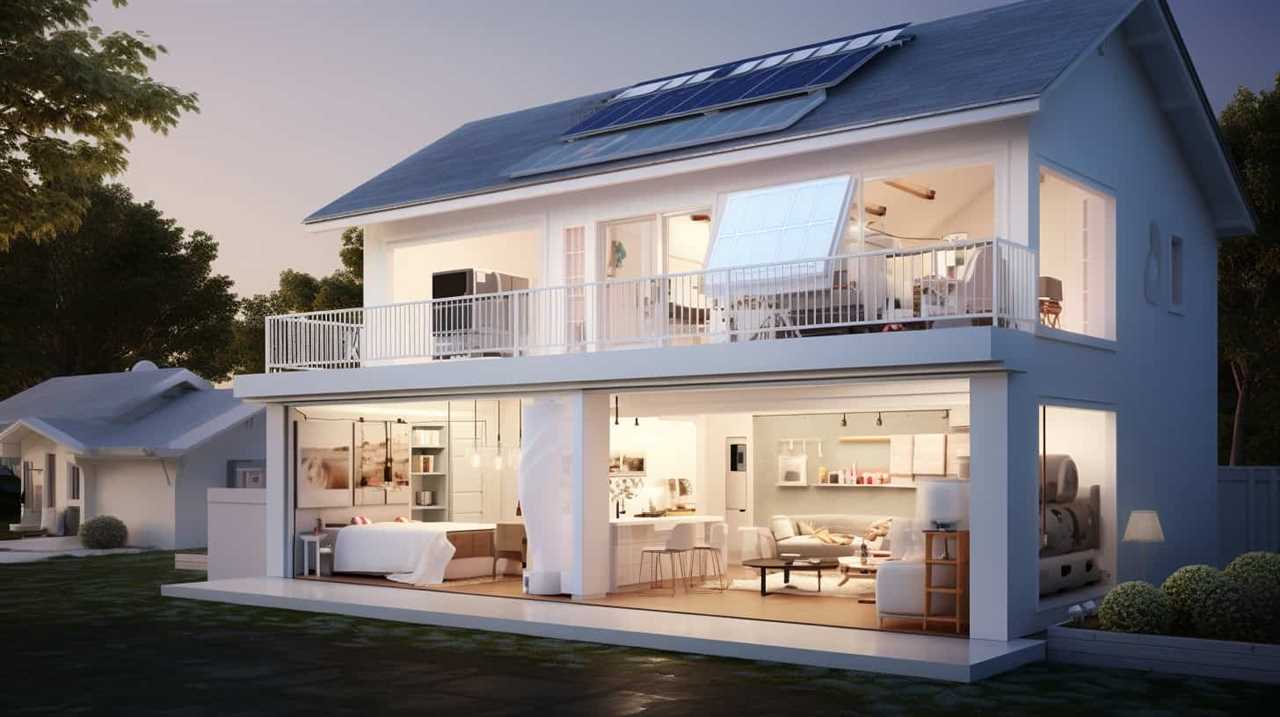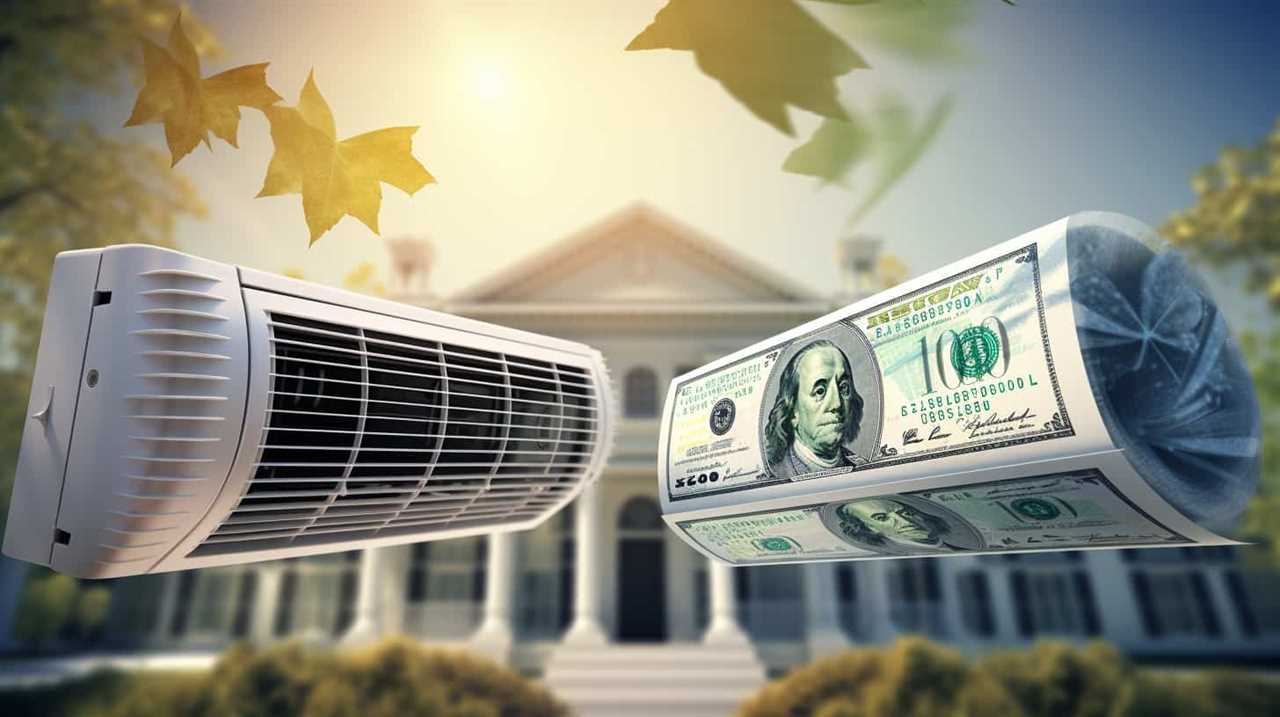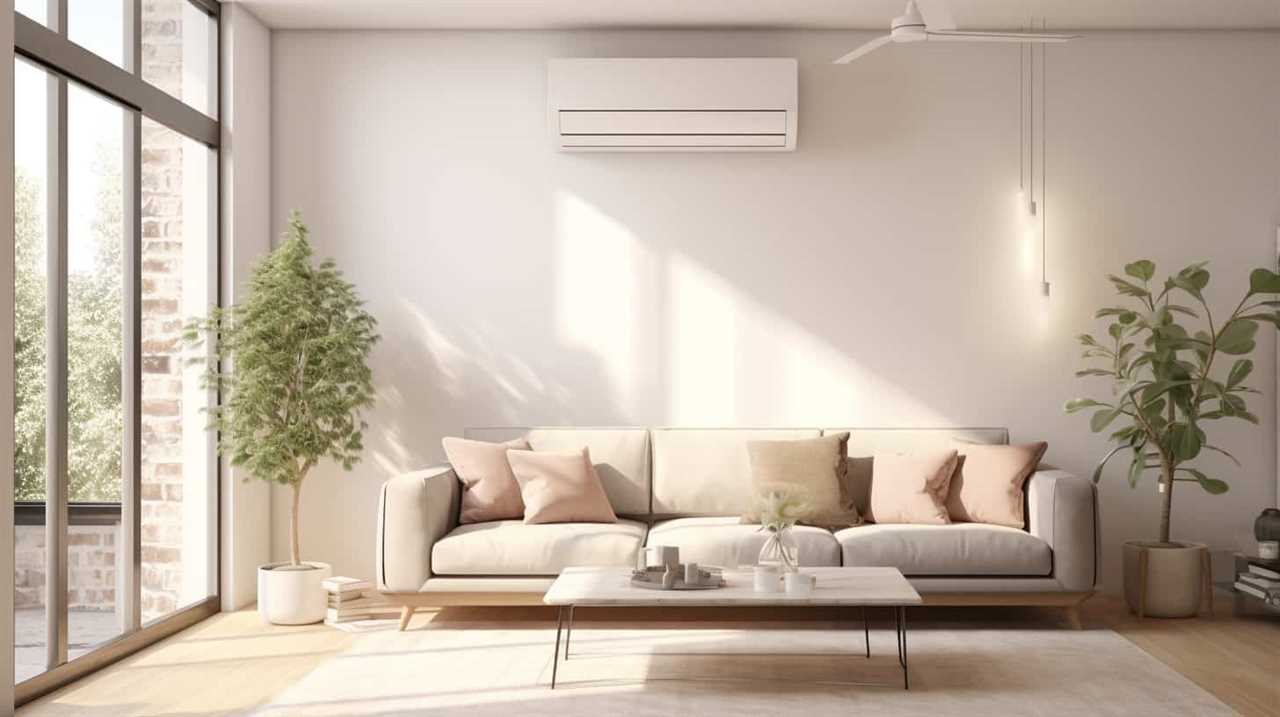Are you aware that optimizing your AC heat pump’s efficiency can result in saving up to 25% on your energy expenses?
In this article, we will explore 13 key factors to help you achieve optimal efficiency and comfort.
From regular maintenance and proper sizing to upgrading to energy-efficient models and integrating smart technology, we’ll provide you with detailed tips and insights.
By implementing these strategies, you can not only save money but also contribute to a greener and more sustainable future.
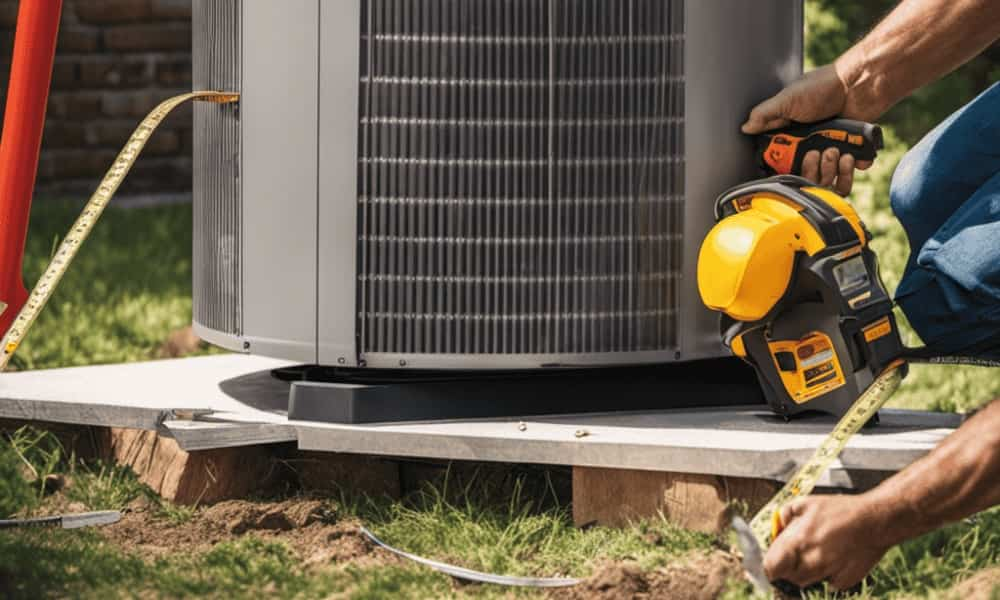
Key Takeaways
- Regular maintenance and proper installation are crucial for optimal efficiency and extended lifespan of the AC heat pump.
- Optimal temperature settings and efficient airflow management contribute to maximizing efficiency and reducing energy consumption.
- Upgrading to energy-efficient models and utilizing programmable thermostats can significantly lower utility bills and provide precise control over heating and cooling cycles.
- Insulating and sealing ductwork, managing sunlight and shade, and considering geothermal options are effective ways to improve energy efficiency and minimize heat transfer.
Importance of Regular Maintenance
Regular maintenance is crucial in ensuring optimal efficiency for your AC heat pump.
One important aspect of regular maintenance is filter replacement. Over time, the filter in your AC heat pump can become clogged with dust, dirt, and other particles, which can restrict airflow and reduce efficiency.
By regularly replacing the filter, you can ensure proper airflow and prevent the system from working harder than necessary.
Another key maintenance task is condenser coil cleaning. The condenser coil is responsible for releasing heat from the system, and if it becomes dirty or blocked, it can hinder heat transfer and reduce efficiency.

Regularly cleaning the condenser coil removes dirt and debris, allowing the system to operate at its best.
Proper Sizing and Installation
When it comes to maximizing AC heat pump efficiency, proper sizing and installation are crucial factors to consider.
Correct size matters because an oversized or undersized heat pump can lead to inefficiency and increased energy consumption.
Professional installation ensures efficiency by ensuring that the unit is installed correctly, with proper ductwork and airflow.
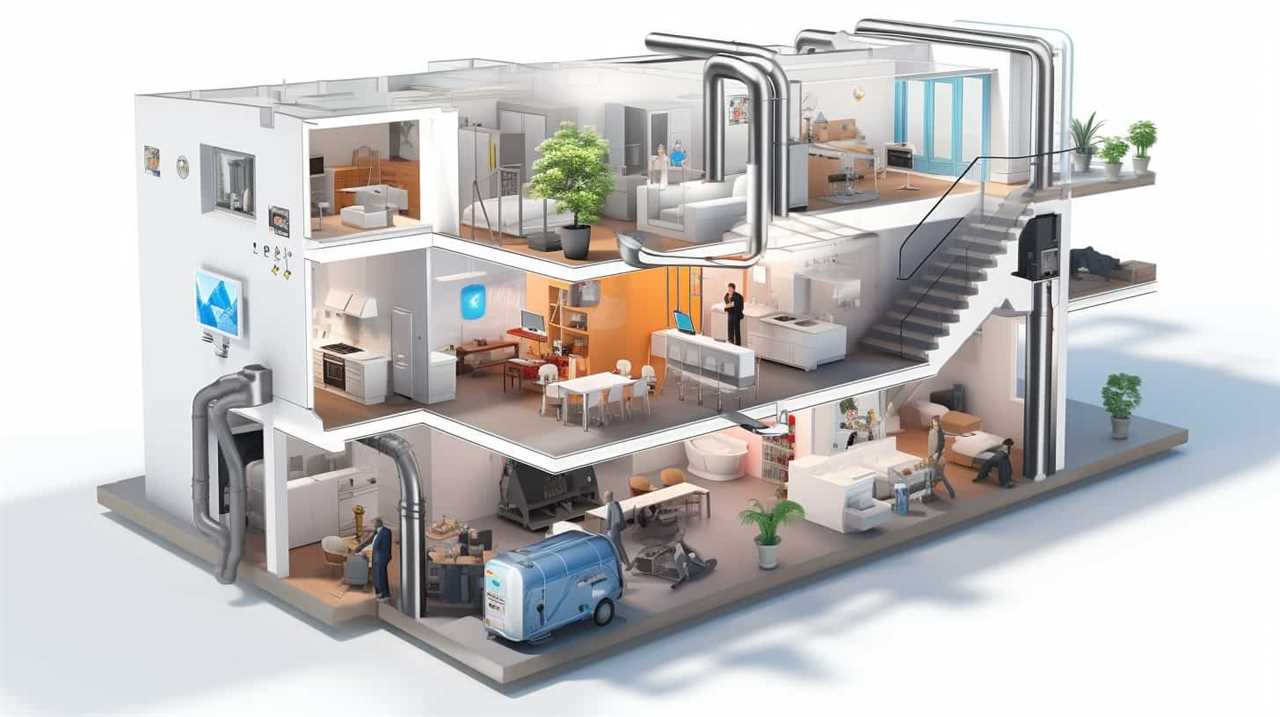
Correct Size Matters
To ensure optimal efficiency, it’s essential that we properly size and install the AC heat pump. Correct sizing and installation guidelines are crucial in maximizing the performance of the system. Here are three key factors to consider:
-
Load Calculation: Conduct a load calculation to determine the correct size of the AC heat pump for your space. This calculation takes into account factors such as the size of the area, insulation levels, and climate conditions. Oversized or undersized units can lead to energy wastage and decreased efficiency.
-
Ductwork Design: Proper ductwork design is essential for efficient airflow distribution. Ensure that the ducts are correctly sized and sealed to minimize air leaks. Improper ductwork can result in uneven cooling or heating, reduced airflow, and increased energy consumption.
-
Professional Installation: Hire a qualified HVAC professional to install the AC heat pump. They’ll ensure that the unit is installed according to manufacturer guidelines, including proper placement, electrical connections, and refrigerant charge. A professional installation guarantees optimal performance and longevity of the system.
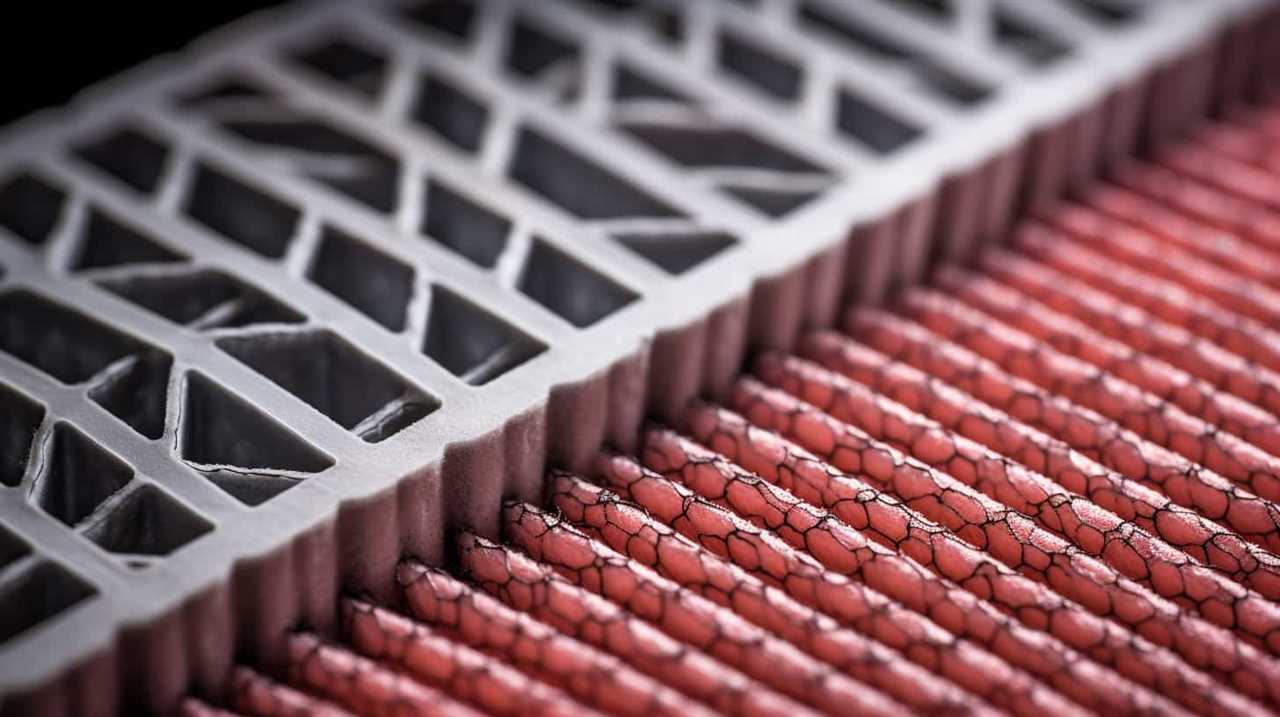
Professional Installation Ensures Efficiency
One crucial factor in maximizing the efficiency of our AC heat pump is ensuring professional installation for proper sizing and installation. Proper installation plays a significant role in achieving optimal energy efficiency.
When it comes to AC heat pumps, the correct installation ensures that the unit operates at its highest efficiency, saving energy and reducing costs. A professional installer will carefully assess the specific needs of your space, ensuring that the heat pump is appropriately sized and positioned. They’ll also ensure that all components are installed correctly, including the indoor and outdoor units, refrigerant lines, and electrical connections.
This attention to detail during installation ensures that the AC heat pump operates efficiently, providing effective cooling and heating while minimizing energy consumption. Trusting a professional installer is essential for maximizing the energy efficiency of your AC heat pump.
Importance of Proper Sizing
Proper sizing is crucial for maximizing our AC heat pump efficiency. When it comes to AC heat pumps, size matters. Here’s why:
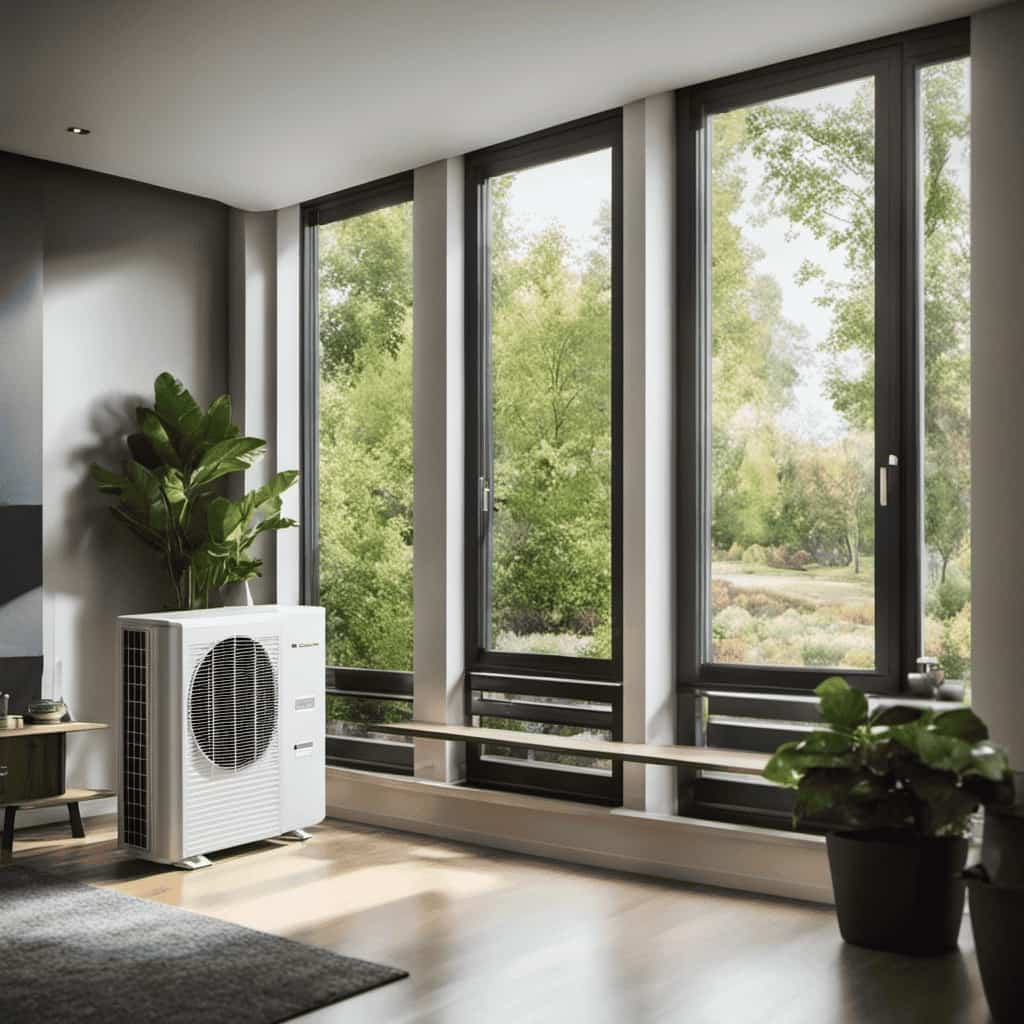
-
Energy consumption: A unit that’s too large will consume excessive energy, resulting in higher utility bills. Conversely, an undersized unit will struggle to cool or heat your space efficiently, leading to increased energy consumption.
-
Proper maintenance: Correctly sizing your AC heat pump ensures that it operates at its optimal capacity, reducing the strain on the system. This not only extends the lifespan of your unit but also minimizes the need for frequent repairs and maintenance.
-
Comfort and performance: A properly sized heat pump will cool or heat your space evenly, providing consistent comfort throughout. This eliminates hot and cold spots, ensuring that you enjoy the full potential of your AC heat pump.
Optimal Temperature Settings
We recommend setting your AC heat pump to a specific temperature range for optimal efficiency. Maintaining optimal energy saving and temperature control is crucial in maximizing the efficiency of your AC heat pump.

The recommended temperature range for cooling is typically between 24 to 26 degrees Celsius (75 to 78 degrees Fahrenheit), while for heating, it’s generally between 19 to 22 degrees Celsius (66 to 72 degrees Fahrenheit). These temperature ranges strike a balance between comfort and energy efficiency.
Setting your AC heat pump within these ranges ensures that it operates efficiently without consuming excessive energy. By adhering to these optimal temperature settings, you can reduce energy consumption and save on your utility bills.
Now, let’s move on to the next section and discuss efficient airflow management.
Efficient Airflow Management
When it comes to efficient airflow management for your AC heat pump, there are three key points to consider.
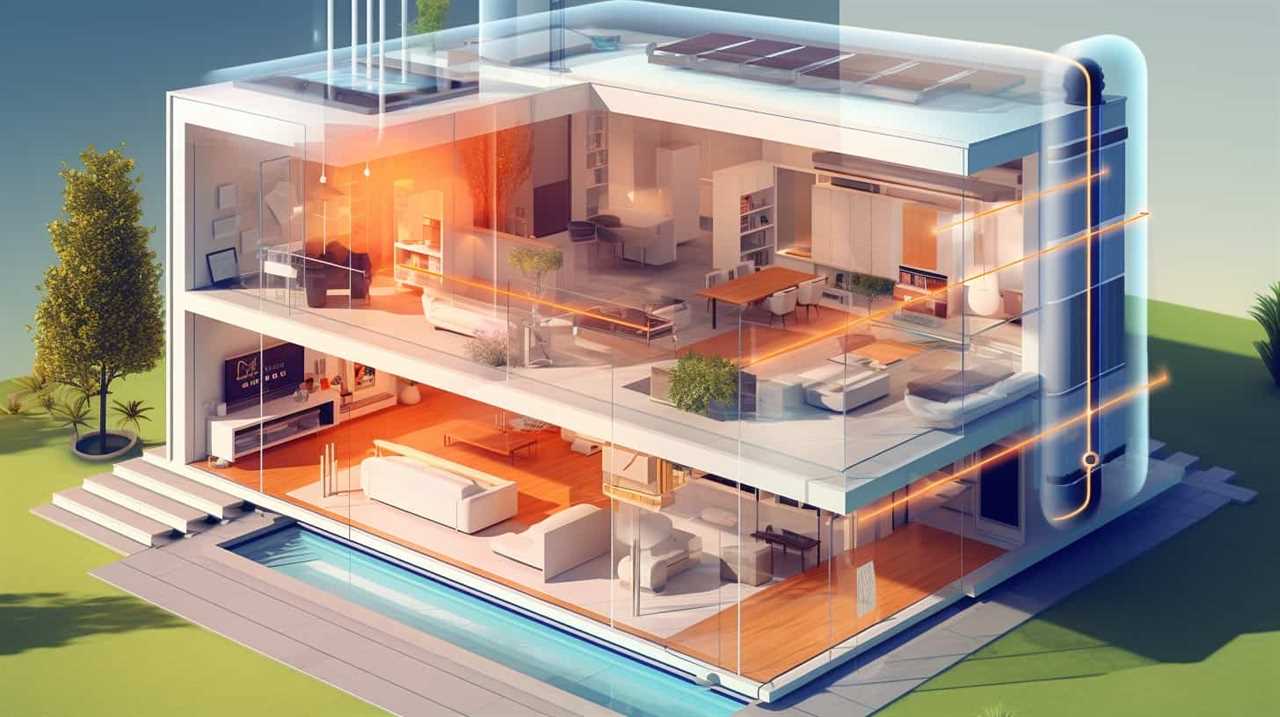
First, regular filter maintenance is crucial to ensure optimal airflow and prevent a buildup of dust and debris that can hinder performance.
Second, proper vent placement is essential to ensure that air is distributed evenly throughout your space, maximizing comfort and efficiency.
Lastly, duct sealing is necessary to minimize air leaks and ensure that conditioned air is delivered efficiently to each room.
Filter Maintenance Importance
Regularly cleaning and replacing air filters is crucial for maintaining efficient airflow in our AC heat pump systems. Proper filter maintenance not only ensures optimal performance but also contributes to improved air quality in our homes.

Here are three key reasons why filter maintenance is important:
-
Filter replacement: Over time, air filters accumulate dust, pollen, and other airborne particles. This buildup restricts airflow and reduces the efficiency of our AC heat pump systems. Regularly replacing filters helps maintain unrestricted airflow and prevents system strain.
-
Air quality improvement: Clean filters trap and remove contaminants from the air, such as allergens, pet dander, and mold spores. By regularly cleaning or replacing filters, we can improve the air quality in our homes, providing a healthier environment for ourselves and our families.
-
Energy efficiency: Clogged filters force our AC heat pump systems to work harder, resulting in increased energy consumption. By keeping filters clean and replacing them as recommended by the manufacturer, we can maximize energy efficiency and reduce utility costs.
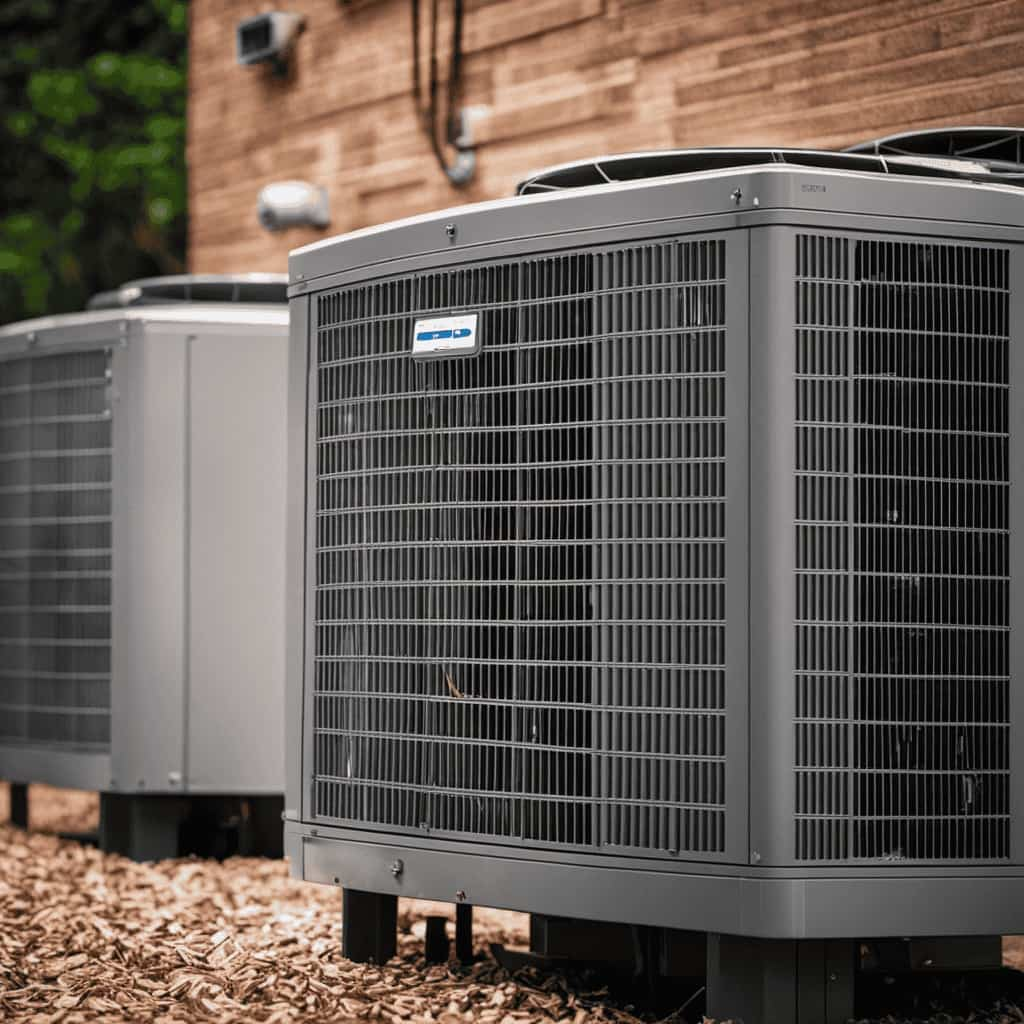
Proper Vent Placement
To maximize the efficiency of our AC heat pump systems, it’s important to prioritize proper vent placement for efficient airflow management. Vent maintenance plays a crucial role in ensuring the optimal performance of our HVAC system. Regular cleaning and inspection of vents can prevent blockages and obstructions that can hinder airflow.
Additionally, energy-efficient upgrades, such as installing adjustable vents, can help regulate airflow and direct it to specific areas as needed. Proper vent placement involves considering factors such as room size, layout, and furniture placement to ensure that air is evenly distributed throughout the space.
Duct Sealing Necessity
Our duct system requires proper sealing to ensure efficient airflow management. Duct sealing is an essential step in maintaining the optimal performance of your AC heat pump.
Here are three reasons why duct sealing is necessary:

-
Improved Energy Efficiency: By sealing any leaks or gaps in the ductwork, you can prevent air leakage, which can result in significant energy loss. This, in turn, reduces your energy consumption and lowers your utility bills.
-
Enhanced Indoor Air Quality: Sealing your ducts prevents dust, allergens, and other contaminants from entering the system and circulating throughout your home. Regular duct cleaning can further improve the quality of the air you breathe.
-
Consistent Comfort: Properly sealed ducts ensure that conditioned air reaches every room in your house, providing consistent temperature and airflow distribution throughout.
By addressing duct sealing and maintenance, you can optimize your AC heat pump’s efficiency and minimize energy consumption.
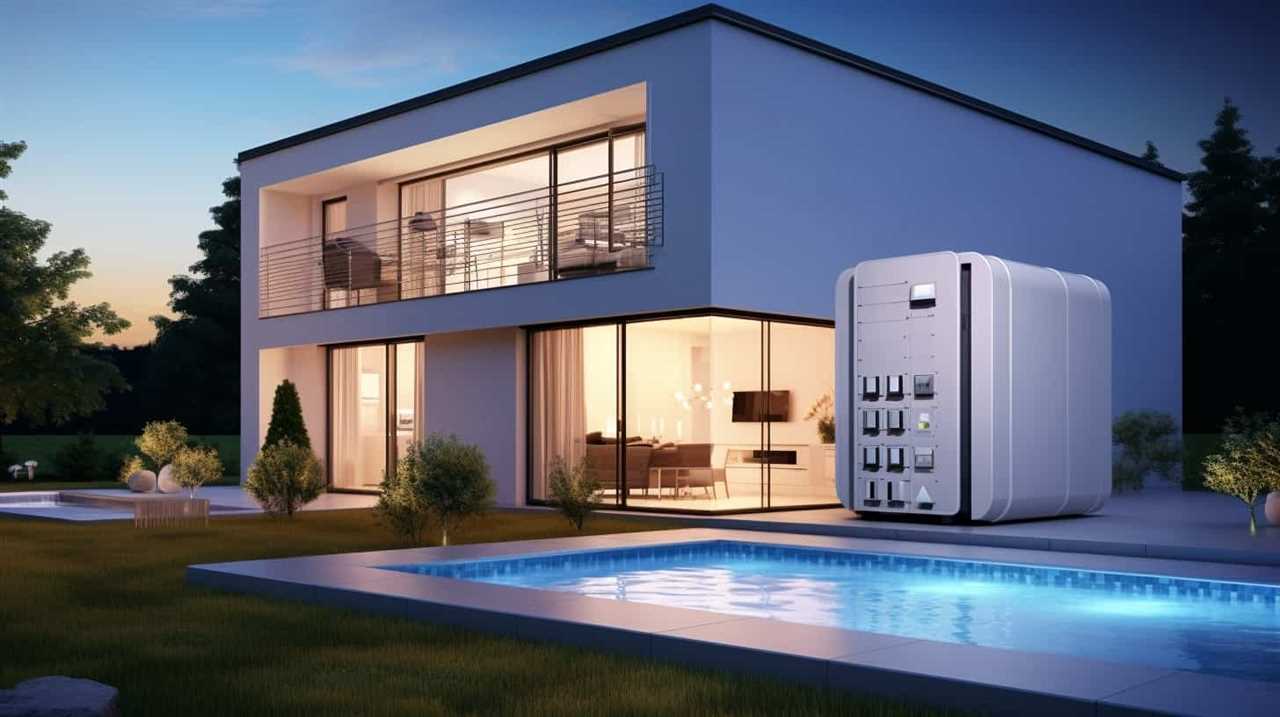
Now, let’s explore the benefits of upgrading to energy-efficient models.
Upgrading to Energy-Efficient Models
We should consider upgrading to energy-efficient models to maximize our AC heat pump efficiency. Energy efficient models are designed to consume less energy while still providing optimal cooling and heating performance. These models utilize advanced technologies, such as variable speed compressors and smart thermostats, to achieve higher energy efficiency ratings.
By upgrading to these models, we can significantly reduce our energy consumption and lower our utility bills. Additionally, geothermal options are also available for those who want to further improve their AC heat pump efficiency. Geothermal heat pumps utilize the constant temperature of the Earth to provide both heating and cooling, resulting in even greater energy savings.
Investing in energy-efficient models and exploring geothermal options won’t only benefit us financially, but also contribute to a more sustainable and eco-friendly environment.

Utilizing Programmable Thermostats
When it comes to maximizing AC heat pump efficiency, utilizing programmable thermostats is a key factor to consider.
By implementing temperature scheduling, homeowners can reap a multitude of benefits, such as customized comfort levels and reduced energy consumption.
Programmable thermostats allow for precise control over heating and cooling cycles, optimizing energy-saving potential and ultimately leading to lower utility bills.
Temperature Scheduling Benefits
Utilizing programmable thermostats can maximize the efficiency of your AC heat pump by scheduling temperatures. This temperature optimization technique allows you to control the heating and cooling cycles based on your specific needs, leading to significant energy savings.
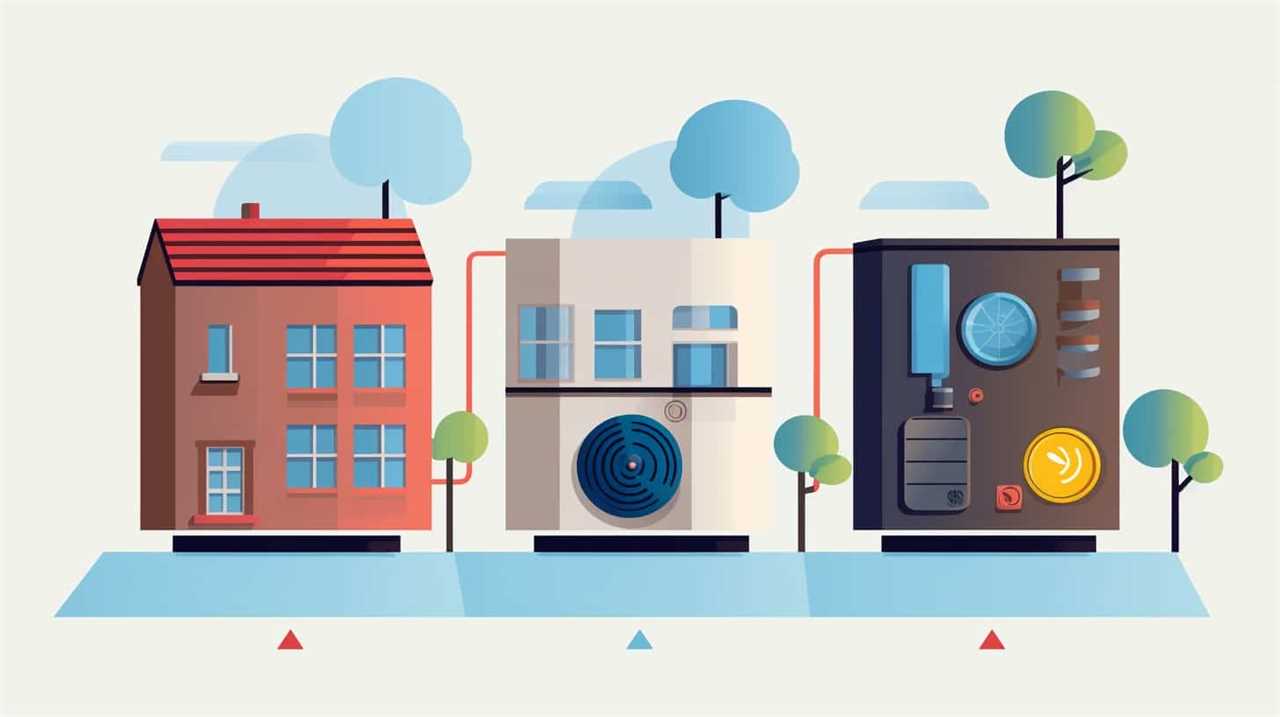
By conducting an energy consumption analysis, you can identify the optimal temperature settings for different times of the day and adjust the thermostat accordingly. Here are three key benefits of temperature scheduling:
-
Energy Efficiency: Programmable thermostats enable you to set different temperatures for various times, such as lowering the temperature when you’re away or asleep, resulting in reduced energy consumption and lower utility bills.
-
Comfort Enhancement: With temperature scheduling, you can ensure that your living space is at the desired temperature when you wake up or return home, providing a comfortable environment without wasting energy.
-
Convenience: By programming your thermostat, you can automate temperature adjustments, eliminating the need for manual changes and ensuring a hassle-free experience.
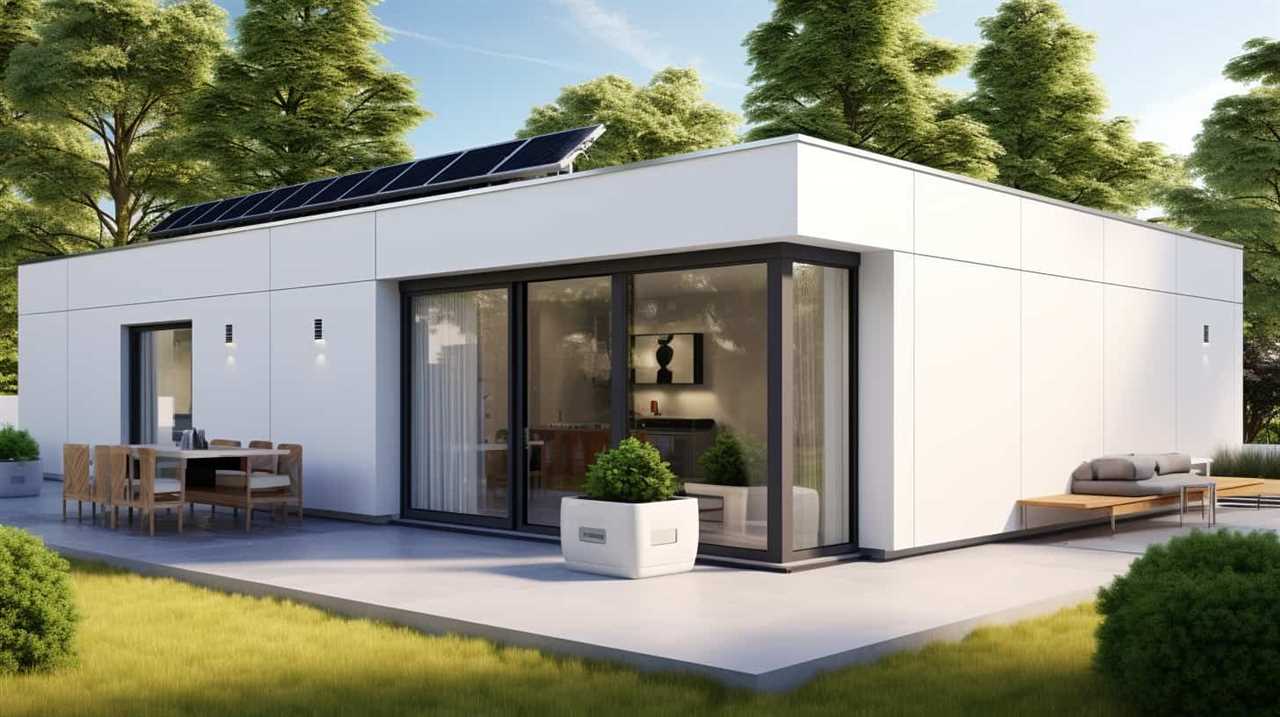
Energy-Saving Potential Explored
By optimizing temperature settings and utilizing programmable thermostats, we can maximize energy-saving potential.
Programmable thermostats allow us to schedule temperature adjustments based on our daily routines, ensuring that the AC heat pump operates efficiently when needed and reduces energy consumption when not in use. These thermostats offer various features, such as multiple temperature settings throughout the day, remote access control, and even learning capabilities to adapt to our preferences over time.
With programmable thermostats, we can set the temperature to automatically lower when we’re away from home or asleep, thus reducing unnecessary cooling or heating. By utilizing these features effectively, we can significantly reduce our energy consumption and maximize the efficiency of our AC heat pump, leading to cost savings and a more sustainable environment.
Insulating and Sealing Ductwork
We should prioritize insulating and sealing our ductwork to maximize AC heat pump efficiency. Properly insulated and sealed ductwork prevents air leakage and minimizes energy loss, resulting in improved performance and reduced energy consumption.
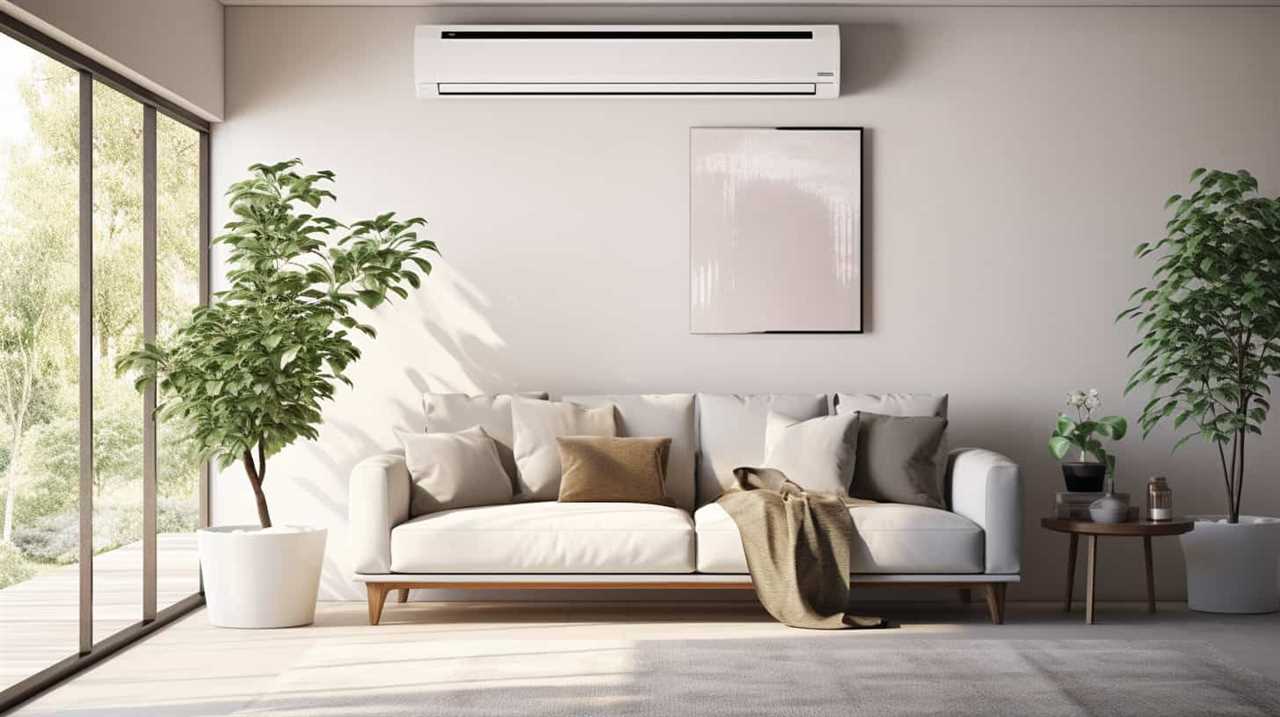
Here are three energy-saving techniques related to ductwork insulation:
-
Seal all air leaks: Identify and seal any gaps, cracks, or loose connections in the ductwork using appropriate sealing materials. This prevents air from escaping or entering the system, ensuring efficient airflow and temperature control.
-
Insulate ducts in unconditioned spaces: Insulating ducts located in areas such as attics, basements, or crawl spaces helps maintain the desired temperature by reducing heat gain or loss. Insulation materials like fiberglass or foam board can be used to wrap the ducts.
-
Consider duct insulation upgrades: If your ductwork is older or poorly insulated, consider upgrading the insulation. This can significantly improve energy efficiency and reduce heat transfer, leading to lower energy bills and a more comfortable indoor environment.
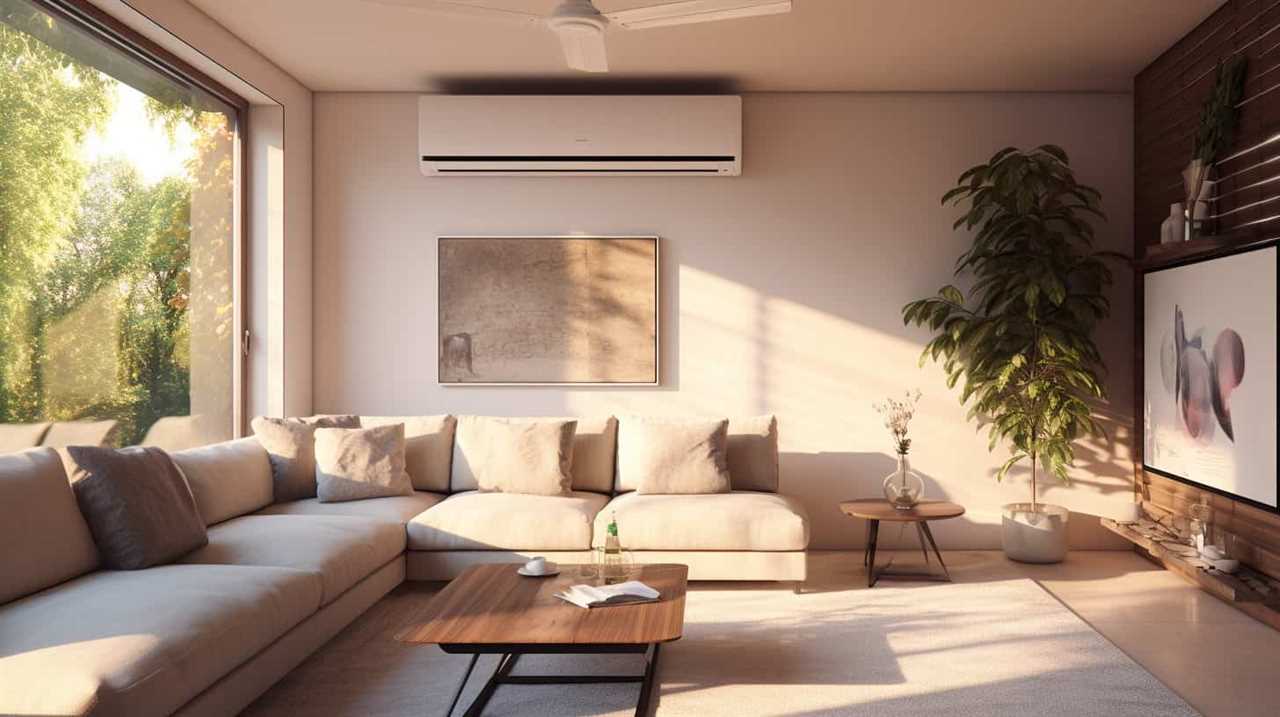
Cleaning and Changing Air Filters
To ensure optimal AC heat pump efficiency, we should regularly clean and change our air filters. Proper air filter maintenance is crucial in keeping our system running smoothly and efficiently. Over time, air filters can become clogged with dust, dirt, and other particles, obstructing the airflow and reducing the efficiency of our AC heat pump. By regularly cleaning or replacing the air filters, we can improve the indoor air quality, reduce energy consumption, and extend the lifespan of our system.
It’s recommended to clean or replace the air filters every 1-3 months, depending on the level of pollutants in our environment. This simple maintenance task can have a significant impact on the performance and efficiency of our AC heat pump, ensuring that it runs at its best.
Now that we understand the importance of air filter maintenance and replacement, let’s move on to the next section: managing sunlight and shade.
Managing Sunlight and Shade
Our approach to managing sunlight and shade plays a crucial role in maximizing AC heat pump efficiency. By strategically controlling the amount of sunlight that enters our space, we can optimize natural light while minimizing heat gain.

To achieve this, we employ various shade strategies that effectively block direct sunlight during peak heat hours. These strategies include:
- Installing window treatments such as blinds, shades, or curtains that can be closed during the hottest parts of the day.
- Utilizing exterior shading devices such as awnings or pergolas to create a barrier between the sun and the building.
- Incorporating landscaping elements like trees, shrubs, or trellises that provide shade to windows and walls.
Using Ceiling Fans and Ventilation
Ceiling fans and ventilation play a vital role in maximizing AC heat pump efficiency. By understanding the benefits of ceiling fans and implementing effective ventilation techniques, you can enhance the performance of your AC heat pump system, resulting in improved energy efficiency and comfort.
Ceiling fans provide several benefits when used in conjunction with AC heat pumps. They help to circulate the conditioned air throughout the room, ensuring even distribution and reducing hot and cold spots. This allows the AC heat pump to operate more efficiently, as it doesn’t have to work as hard to maintain a consistent temperature.
In addition to ceiling fans, proper ventilation techniques are important for maximizing AC heat pump efficiency. Adequate ventilation helps to remove stale air, odors, and excess moisture from your home, ensuring a healthier and more comfortable indoor environment. It also helps to prevent the build-up of pollutants and allergens, improving the overall air quality.
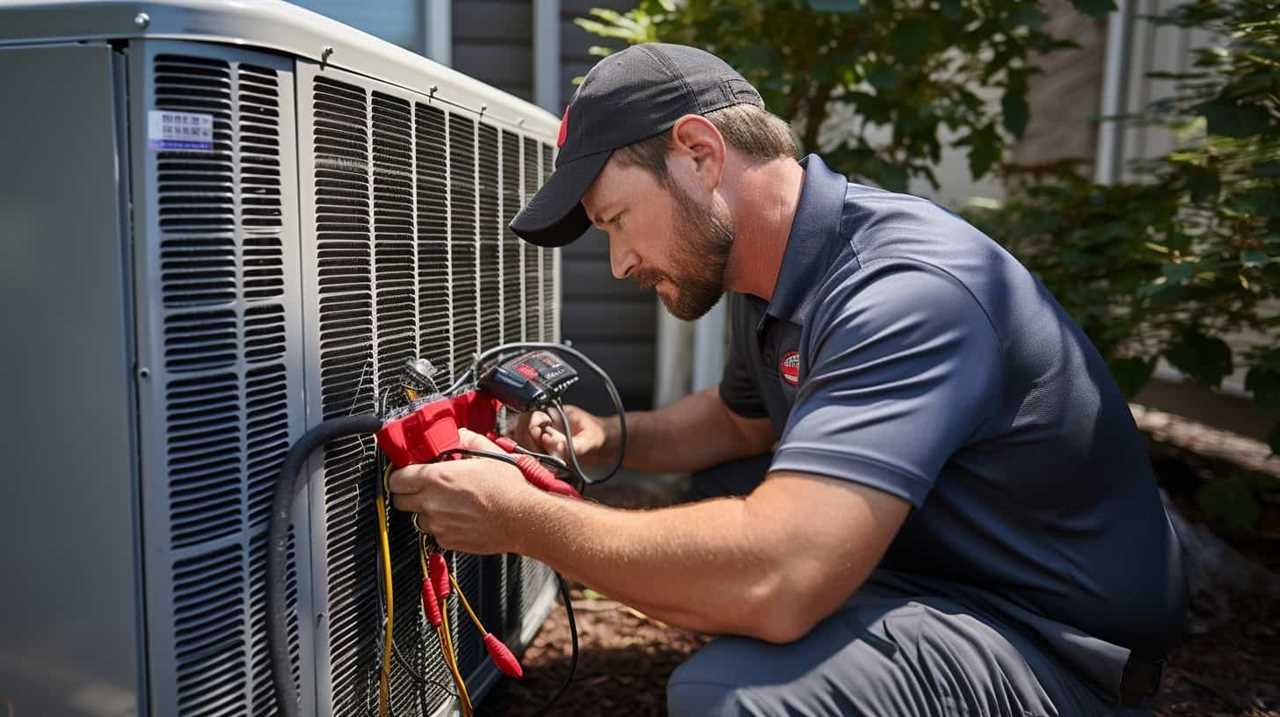
To optimize the benefits of ceiling fans and ventilation, it’s important to ensure that they’re properly sized and positioned. Ceiling fans should be set to run counterclockwise during the summer months to create a cooling breeze effect. Ventilation systems should be strategically placed to facilitate the flow of air and remove pollutants effectively.
Smart Technology Integration
We can maximize the efficiency of our AC heat pump system by integrating smart technology. Smart home integration allows us to control and monitor our AC heat pump remotely, optimizing energy management and ensuring comfort.
Here are three ways smart technology integration can enhance our AC heat pump efficiency:
-
Automated temperature control: Smart thermostats can learn our preferences and adjust the temperature accordingly, minimizing energy waste and maximizing comfort.
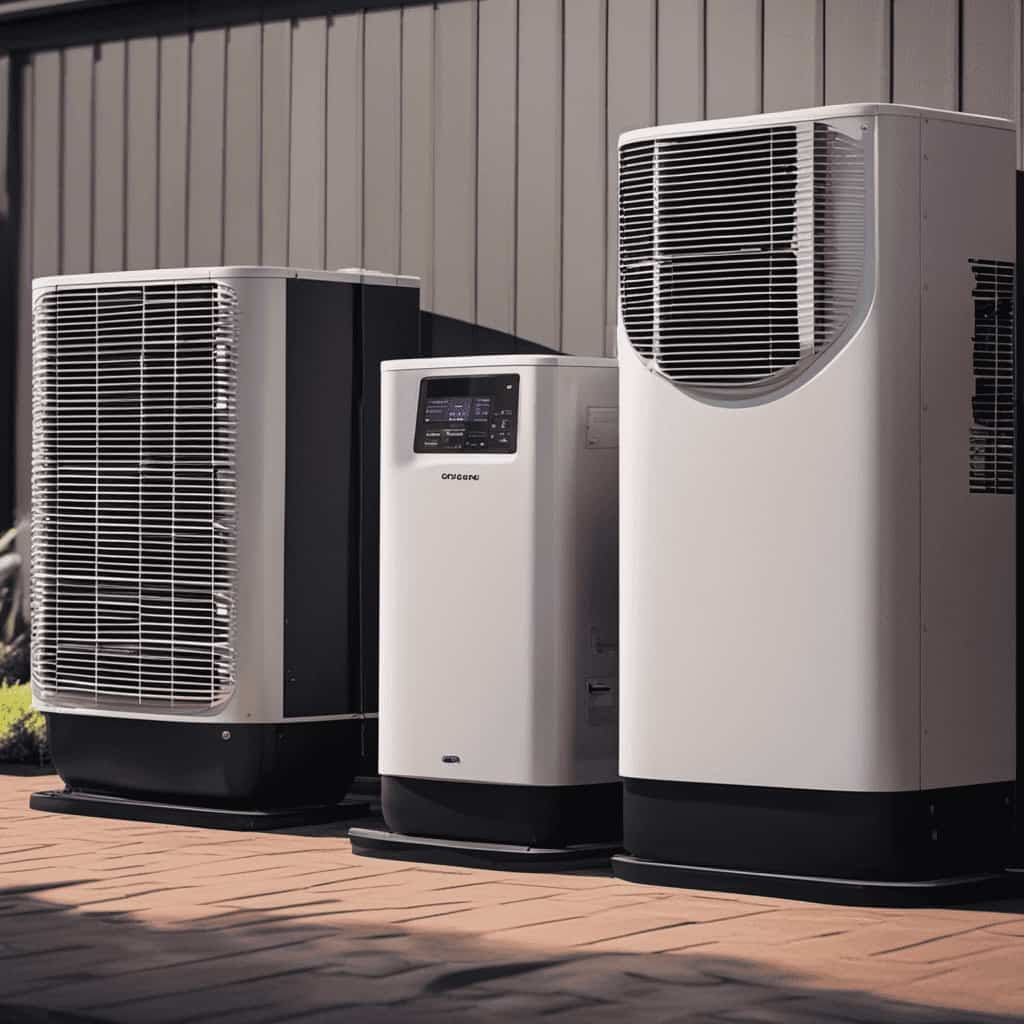
-
Energy usage monitoring: Smart technology provides real-time data on our AC heat pump’s energy consumption, allowing us to identify inefficiencies and make adjustments as needed.
-
Integration with other smart devices: By integrating our AC heat pump with other smart devices, such as occupancy sensors or weather forecast systems, we can optimize energy usage based on occupancy patterns or weather conditions.
Consideration of Geothermal Options
When considering the efficiency of our AC heat pump system, it’s important to explore the potential benefits and drawbacks of geothermal options.
Geothermal installation involves harnessing the constant temperature of the earth to heat and cool our homes, resulting in significant energy savings. By utilizing energy-saving techniques such as geothermal heat pumps, we can reduce our dependence on traditional heating and cooling methods, which often rely on fossil fuels.

Geothermal systems use underground pipes filled with a mixture of water and antifreeze to transfer heat to and from the earth. This process takes advantage of the earth’s stable temperature, which remains relatively constant throughout the year.
Although geothermal installation can be costly upfront, the long-term energy savings make it a worthwhile investment.
Professional Energy Audits and Assessments
To maximize our AC heat pump efficiency, it’s essential to schedule professional energy audits and assessments. These audits and assessments provide valuable insights into our energy usage and help identify areas where we can improve efficiency.
Here are some key benefits of professional energy audits and assessments:
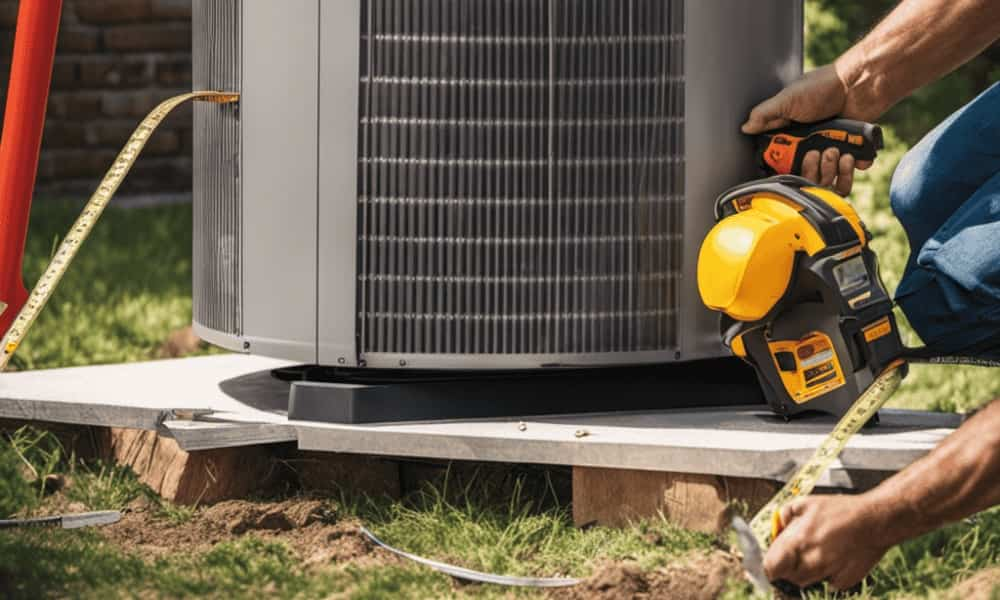
-
Identification of energy-saving opportunities: Trained professionals can identify potential energy-saving opportunities that we might’ve overlooked. They can assess the insulation, air sealing, and ductwork of our HVAC system, ensuring that it’s operating at peak efficiency.
-
Detailed analysis of energy usage: Energy audits provide a comprehensive analysis of our energy usage patterns, helping us understand where energy is being wasted and how we can make improvements.
-
Recommendations for energy-saving practices: The professionals conducting the audits can provide us with personalized recommendations for energy-saving practices. These recommendations can include tips on thermostat settings, air filter maintenance, and HVAC system maintenance.
Frequently Asked Questions
Are There Any Additional Benefits of Regular Maintenance for an AC Heat Pump Besides Increasing Its Efficiency?
Regular maintenance for an AC heat pump offers many benefits in addition to increasing efficiency. It leads to long-term cost savings, extends the lifespan of the pump, improves indoor air quality, and helps prevent costly breakdowns.

How Can I Determine the Proper Size and Installation Requirements for an AC Heat Pump?
To determine the proper size and installation requirements for an AC heat pump, we consider factors like the square footage of your space, insulation levels, and climate conditions. Proper sizing ensures optimum efficiency and performance.
Is There an Optimal Temperature Setting for an AC Heat Pump That Can Maximize Its Efficiency?
There isn’t one optimal temperature setting for an AC heat pump to maximize efficiency. However, by following energy-saving tips and considering factors like climate and personal comfort, you can find the right balance for your system.
What Are Some Effective Ways to Manage Airflow in Order to Improve the Efficiency of an AC Heat Pump?
To improve the efficiency of an AC heat pump, we can optimize fan speed and implement effective airflow management techniques. By considering these factors, we can maximize the performance of our system.
Are There Any Government Incentives or Rebates Available for Upgrading to Energy-Efficient Models of AC Heat Pumps?
Yes, there are government incentives and rebates available for upgrading to energy-efficient models of AC heat pumps. These incentives encourage the use of eco-friendly technology and can help reduce the financial burden of purchasing and installing energy-efficient units.
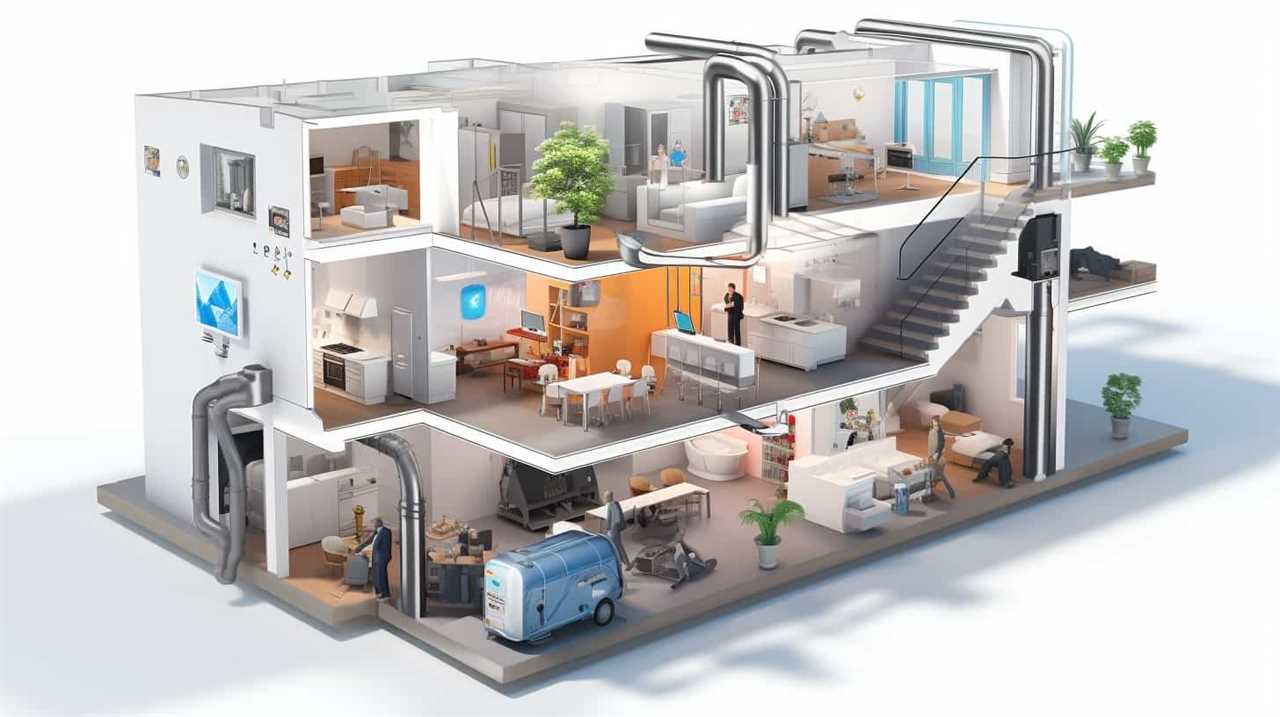
Conclusion
In conclusion, maximizing the efficiency of your AC heat pump is crucial for optimal performance and energy savings. Regular maintenance, proper sizing and installation, optimal temperature settings, and efficient airflow management are key factors to consider.
Upgrading to energy-efficient models, using ceiling fans and ventilation, integrating smart technology, and exploring geothermal options can further enhance efficiency.
Lastly, professional energy audits and assessments help identify areas for improvement. So, why settle for subpar efficiency when you can maximize your AC heat pump’s potential?
